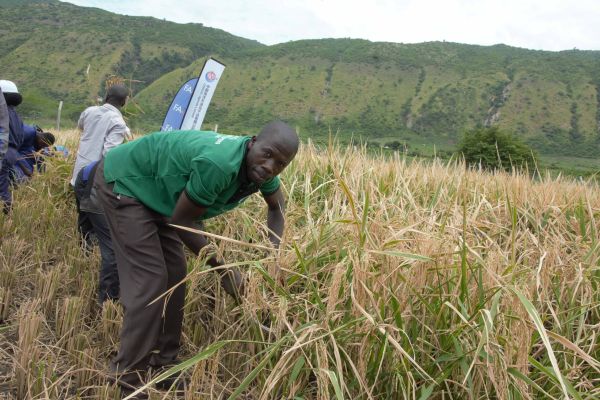KIKUUBE, October 17, 2025 — In a bid to increase agricultural production, rice, and millet farmers in Kikuube and Hoima districts are appealing for financial support from government and development partners to acquire irrigation equipment.
These farmers are among those affected by the Kingfisher oil project in Buhuka Kyangwali Kikuube district, and are currently benefitting from China National Offshore Oil Corporation [CNOOC]’s innovative livelihood restoration programmes.
The initiatives, which include rice, millet, piggery, and tree planting projects, aim to foster socio-economic transformation within local communities in the Albertine Graben region.
A total of 394 farmers have shown interest in rice and millet cultivation, while 479 households are engaged in pig rearing. The beneficiaries have been supported with high-yield WDR-73 rice variety seeds and foxtail millet seeds.
However, farmers involved in rice and millet production say they are in urgent need of irrigation equipment, as their activities are entirely dependent on unreliable rainfall.
Henry Tibenderana, a farmer from Kitenga Village in Kabaale Sub-county, Hoima District, said climate change has made rainfall increasingly unpredictable, which is affecting crop yields.
“The WDR-73 rice variety is a good breed that can provide better yields compared to the local variety, but poor weather conditions often let us down,” he said. Tibenderana added that with irrigation support from either CNOOC or the government, farmers would be able to cultivate rice year-round.
“Last season, I planted rice on half an acre, but due to drought, I couldn’t even harvest half a tonne, even though I had expected to get two tonnes. If I had irrigation equipment, I wouldn’t have suffered such a loss,” he added.
Emmanuel Nsimire and Godfrey Rubihayo, both farmers from Kyangwali Sub-county in Kikuube District, echoed the need for mechanisation, particularly irrigation systems and tractors, to complement the support they’ve received.
They noted that most farmers still rely heavily on rainfall, which exposes them to repeated losses. “I have land near a swamp, but I can’t utilise this water to improve my farming. If I could be supported with a generator and a water pump, I’d be able to produce rice and millet all year without relying on rain,” said one farmer.
He also appealed to the government to provide tractors, noting that farmers still depend on hand hoes, which limits their ability to engage in commercial farming. “We have the land, but hand hoes cannot help us cultivate large areas. This has kept us in subsistence farming and poverty. The government should consider mechanising agriculture, especially for those of us affected by oil developments,” he added.
Kikuube District Chairperson, Peter Banura, said that farming has become a gamble due to unreliable weather patterns, and stressed the need to adopt irrigation as a solution.
He pledged to write to development partners and the Ministry of Agriculture to lobby for irrigation support for farmers.
However, Banura commended CNOOC for introducing improved rice and millet varieties in the region, saying the initiative is likely to increase food production in the district. He noted that the programme has demonstrated that Buhuka land can support agriculture, and will help local fishermen diversify their income through farming.
CNOOC Vice-President, Ma Peixin, said 394 farmers have been trained, with 80 now actively cultivating rice and millet in Kyangwali and Kabwoya sub-counties in Kikuube District, and Kabaale Sub-county in Hoima District—areas through which the feeder pipeline passes.
He said the farmers had been supported with fertilisers, seeds, and agronomic training. “Projected harvests indicate rice yields of between 2.5 and 3 tonnes per acre, while millet can yield between 1.5 and 2 tonnes per acre,” said Ma, highlighting the programme’s potential to transform household food security and incomes.
He added that demonstration gardens had been established under the programme, including 1.5 acres of rice in Buhuka Parish and one acre of millet in Kaseeta Parish, Kabwoya Sub-county.
“This is the first time rice has been grown in Buhuka, along the shores of Lake Albert, and it has proven to be suitable for rice cultivation. We plan to scale up from demonstration plots to large-scale production,” Ma said.
“This first harvest demonstrates the impact that can be achieved when communities are given the right training and resources. CNOOC Uganda is committed to a holistic approach to green ecology oilfield development. While developing Uganda’s oil resources, we also aim to strengthen local livelihoods and create sustainable benefits for the community.”
Peter Muyimbo, an official from the Ministry of Agriculture, expressed optimism that the programme would help transform agriculture into a commercial venture. He said it would also contribute to the Ministry’s efforts to improve the production of crops such as millet, sorghum, and rice.
https://thecooperator.news/mixed-reactions-as-ministry-destroys-over-30-hectares-of-rice-in-kwania/
Buy your copy of thecooperator magazine from one of our country-wide vending points or an e-copy on emag.thecooperator.news
